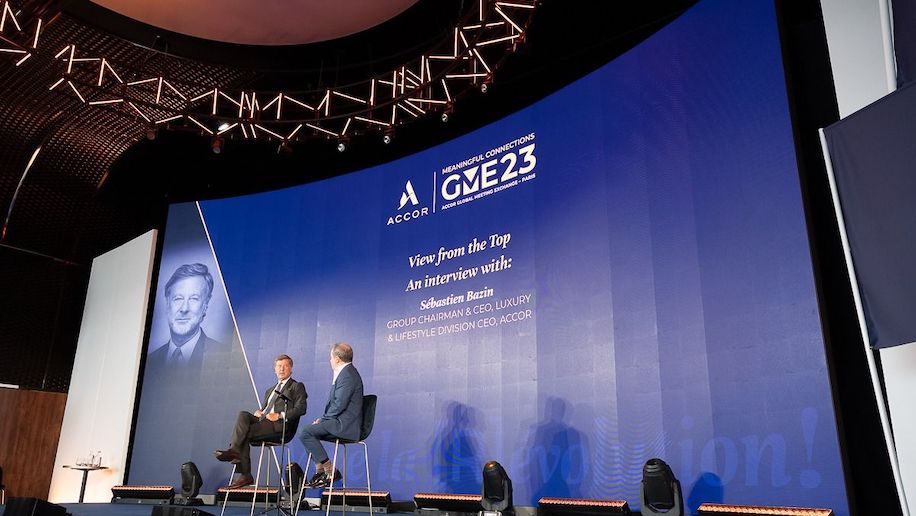
Business Traveller attended Accor’s Global Meeting Exchange 2023, held at the Pullman Paris Montparnasse this past week to hear from the hotel group on the future of MICE as well as sustainability and consumer trends.
Group chairman and CEO of Accor, Sébastien Bazin was interviewed on topics including luxury yacht and train products, sustainability and forthcoming outbound travel from locations such as India.
Orient Express
The talk had a focus on forthcoming products under the Orient Express brand, namely Accor’s train and yacht projects.
Bazin spoke about the growing wealth in the world and the desire to slow down, which has prompted such products. “People are getting richer and richer. I think if you get really rich, the one thing you want to regain control of is your time… Regaining control of your time goes very well with boat and train [travel].”
Business Traveller reported on the return of the Orient Express train, initially scheduled for 2024, earlier this year. A set of 17 carriages from the Nostalgie-Istanbul-Orient-Express incarnation of the train, dating from the 1920s and 1930s, are being restored by architect Maxime d’Angeac with support from hotel group Accor and Orient Express – renderings of which can be seen here.
Accor acquired a 50 per cent stake in the Orient Express name in 2017, which was formerly fully-owned by the SNCF Group.
Bazin revealed that the train is now likely to be delayed until 2025 and is “going to cost a fortune,” with each cabin setting the company back €5 million.
This pales in comparison to Orient Express’ plans on water. Accor has partnered with shipbuilding company Chantiers de l’Atlantique to launch the largest cruise sailing ship ever built: the Orient Express Silenseas – with reservations opening next summer. Accor has signed a letter of intent for two yachts which will set sail in 2026, with reservations opening next summer, one in the Mediterranean and Caribbean and one in Asia.
The 220-metre-long yacht will have 54 cabins, each costing €8 million to create and measuring on average 70 sqm – the largest will measure 1,415 sqm – while facilities will include two swimming pools, two restaurants and a speakeasy bar. Despite the cost, Bazin remained optimistic: “it’s going to be a smashing success”.
Most importantly, the ship will be sustainable, with a hybrid propulsion formula which combines wind power with an engine running on liquefied natural gas. Ultimately Accor hopes to use green hydrogen once the technology is approved for ocean passenger ships.
“For those who really enjoy boating and cruising, don’t ever go in diesel and oil because those are from the past. Do something which is sustainable. The boat [travels] on the wind alone at 70 knots and your glass of wine will stay stable.”
The yacht space is certainly growing among hotel groups, with Four Seasons Yachts launching in 2025 with 95 suites and itineraries in the Mediterranean and Caribbean, and Aman’s 50-suite yacht known as Project Sama also setting sail in 2025.
International travel
When discussing the recovery of international travel in 2023, Bazin stressed that he is a “big advocate for India”, where he describes there is an “emerging middle class population”.
“The emerging middle class went from 300 million to 800 million in the last five years… Probably between 50 and 100 million of those [people] have never travelled outside of India as of yet.”
Bazin highlighted the growth of the airline industry in India too, which will boost travel in the region. He noted IndiGo Airlines’ record order for 500 A320 aircraft, which are set to be delivered between 2030 and 2035, with IndiGo stating that it expects to carry 100 million customers this year alone.
“In the next five years, you’re going to have between 30 to 100 million people from India [flying] four to five hours to Southeast Asia, Malaysia, Indonesia, the Middle East and Egypt. We’ve never seen those people before. That alone is changing the travel space…
“And then you add to this the Covid effect that you’ve never seen so many people travelling domestically, a couple hours away from their home, by train and by car. We’ve never seen that before.”
Questioned on how to address the evolving demand, Bazin stressed that hotels shouldn’t “try to segregate business and leisure” due to the growing blend of the two, and that they should “embrace remote work”.
Finally, he added that F&B offerings are a key focus for Accor’s brands in the future.
“What’s going to be critical in the years ahead is the welcoming, the lobby, the bar, the restaurant, the people you meet. It’s all this hospitality [that] we’ve missed for so many years.” He described the guest room, by comparison, as an “accessory”.
He spoke once again of the importance of designing for the local community rather than the traveller, which he championed this year at the International Hospitality Investment Forum (IHIF) and also as early as 2018.












